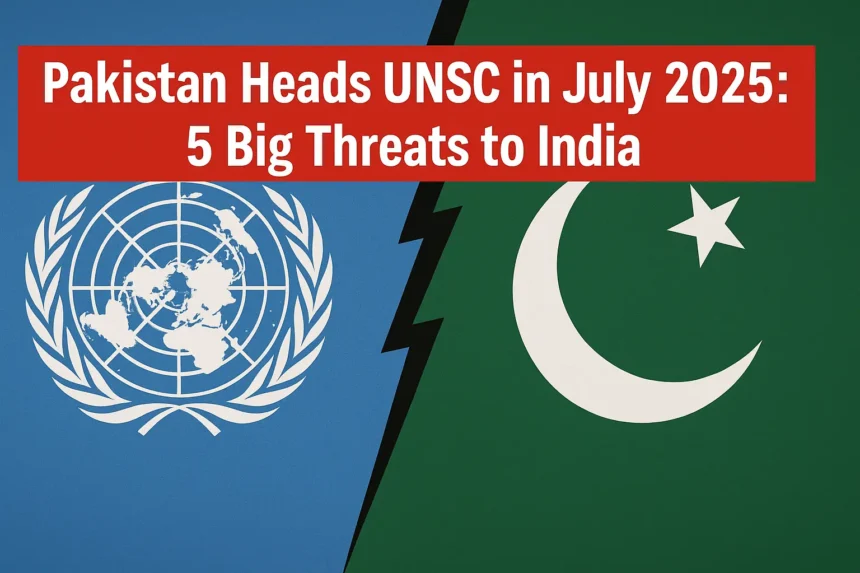Pakistan Heads UNSC in July 2025: India’s Growing Concerns
A Diplomatic Storm in the Making
Come July 2025, Pakistan will assume the presidency of the United Nations Security Council (UNSC)—a move that’s raising serious alarms in New Delhi. With Pakistan’s history of leveraging global platforms against India, its upcoming role is being viewed with deep suspicion and concern. Could this be a turning point in Indo-Pak diplomatic dynamics? Or just another failed attempt to internationalize bilateral tensions?
1. Pakistan’s UNSC Presidency: A Powerful Yet Temporary Chair
As a non-permanent member of the UNSC for 2025-26, Pakistan gets the opportunity to chair the Council for a month—July 2025, specifically. This position allows Pakistan to:
- Set meeting agendas
- Preside over high-level discussions
- Influence thematic debates
While the presidency doesn’t offer veto power, it’s still a symbolically powerful position, especially for nations seeking global validation.
2. Operation Sindoor: The Trigger Pakistan May Exploit
Pakistan’s presidency comes in the shadow of India’s bold military campaign, Operation Sindoor. The Indian Army targeted terrorist camps in Pakistan-Occupied Kashmir (PoK) and Punjab in retaliation for cross-border attacks.
There are real fears that Pakistan might use its UNSC presidency to:
- Accuse India of human rights violations in PoK
- Organize UNSC events featuring alleged civilian “victims”
- Attempt to pass anti-India resolutions
India has firmly rejected all such accusations as baseless, backed by robust intelligence and international support.
3. Previous Failures: Pakistan’s Isolated Stand
This wouldn’t be the first time Pakistan has tried to globalize its dispute with India. After the May 2025 Pahalgam terror attack, Pakistan called for a special closed-door UNSC meeting. The result?
- No resolution was passed
- Major powers focused on Pakistan’s own role in terrorism
- Concerns were raised over Lashkar-e-Taiba and Pakistan’s missile tests and nuclear posturing
- Despite its efforts, Pakistan stood isolated, unable to convince key members of the Council.
4. India’s Strong Legacy at the UNSC
India may not be a current member of the Security Council, but it holds a powerful legacy. During its presidency in December 2022, India:
- Championed global counter-terrorism cooperation
- Hosted UNSC members in Mumbai and Delhi
- Led the first-ever UNSC Counter-Terrorism Committee meeting outside New York
- Brought focus to the 26/11 Mumbai terror attacks, uniting global sentiment against terrorism
This proactive diplomacy still resonates within the UNSC today and is expected to counterbalance any anti-India narratives.
5. The Real Challenge: Reputational, Not Strategic
Pakistan’s presidency is unlikely to result in any binding resolution against India. Why?
- The UNSC doesn’t function on individual agendas
- Global sentiment post-9/11 and 26/11 is firmly against terrorism
- Member states prioritize peacekeeping, nuclear non-proliferation, and humanitarian crises
However, the reputational damage Pakistan seeks to inflict through media optics and staged events remains a real concern for India.
India’s Counter-Strategy: Evidence and Diplomacy
While India may not have a seat at the UNSC table right now, it’s not sitting idle.
India is:
- Submitting detailed dossiers to the 1267 Sanctions Committee
- Highlighting Pakistan’s sheltering of global terrorists
- Building diplomatic pressure through friendly nations like the US, France, and Russia
This strategy ensures that truth trumps propaganda in international corridors.
Global Opinion: Not in Pakistan’s Favor
The international community is no longer swayed by emotional rhetoric. Today’s UNSC looks at:
- Concrete evidence
- Long-term impact on peace and security
- Accountability of state-sponsored terrorism
Even Pakistan’s all-weather ally China has shown restraint on raising India-specific issues, understanding the larger geopolitical consequences.
What Lies Ahead: A Month of Tactical Diplomacy
July 2025 will be more about optics than outcomes. While Pakistan may make noise, India’s focus will remain on:
- Countering misinformation
- Engaging allies behind the scenes
- Pushing for structural UNSC reforms to prevent misuse of the presidency
India has weathered such storms before—and emerged stronger every time.
How PM Modi’s Strategic Diplomacy Could Neutralize Pakistan’s UNSC Agenda
Prime Minister Narendra Modi’s strategic diplomacy is expected to play a pivotal role in countering Pakistan’s narrative at the UNSC. Leveraging strong ties with key global powers like the US, France, and Russia, India aims to diplomatically isolate Pakistan’s claims. Modi’s proactive outreach through bilateral talks, intelligence sharing, and showcasing credible evidence of cross-border terrorism could shift global focus back to Pakistan’s terror links—dismantling any attempt to malign India’s image on the global stage.
Final Thoughts: India Must Stay Vigilant, Not Reactive
Pakistan’s UNSC presidency is a diplomatic test, but not an existential threat. With strong global partnerships, a clean human rights record, and a clear anti-terror stand, India remains well-positioned to neutralize any temporary hostility from Pakistan.
Want to stay updated on global diplomatic developments and India’s international strategy?
Follow TN HEADLINES24 for real-time analysis, powerful insights, and exclusive expert opinions.
Most read: https://tnheadlines24.com/field-marshal-asim-munir/
Also read: https://tnheadlines24.com/asim-munir/
https://tnheadlines24.com/pak-commander-flees-to-mosque/
Disclaimer: The views and opinions expressed in this article are based on publicly available information and expert analysis. TN HEADLINES24 is not responsible for the accuracy of any claims made by external sources or for the actions of any individuals or organizations mentioned. Readers are advised to verify facts independently and use their discretion while interpreting the content.

